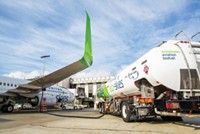Advertisement
Grab your lab coat. Let's get started
Welcome!
Welcome!
Create an account below to get 6 C&EN articles per month, receive newsletters and more - all free.
It seems this is your first time logging in online. Please enter the following information to continue.
As an ACS member you automatically get access to this site. All we need is few more details to create your reading experience.
Not you? Sign in with a different account.
Not you? Sign in with a different account.
ERROR 1
ERROR 1
ERROR 2
ERROR 2
ERROR 2
ERROR 2
ERROR 2
Password and Confirm password must match.
If you have an ACS member number, please enter it here so we can link this account to your membership. (optional)
ERROR 2
ACS values your privacy. By submitting your information, you are gaining access to C&EN and subscribing to our weekly newsletter. We use the information you provide to make your reading experience better, and we will never sell your data to third party members.
Business
Tyson And Syntroleum Partner For Fat-Based Fuel
Food giant teams up with alternative energy firm to build synthetic fuel plant
by Glenn Hess
June 26, 2007
Tyson Foods and Syntroleum announced plans on Monday to make liquid synthetic fuels from animal fats for the diesel, jet, and military fuel markets.
The two companies will produce the fuels through technology developed by Tulsa-based Syntroleum in facilities that will be constructed and operated by their 50-50 joint venture, Dynamic Fuels LLC.
Tyson, one of the world's largest meat producers, will supply feedstock derived primarily from animal fats, including beef tallow, pork lard, and chicken fat. Vegetable oils and greases are also potential raw materials.
Construction on the first plant will start next year at a yet-to-be-determined site in south central U.S. The $150 million facility is expected produce about 75 million gal of synthetic fuel annually starting in 2010. Annual operating profits are forecast between $35 million and $60 million, according to the companies.
"Tyson's venture with Syntroleum represents another significant step forward in our strategy of leveraging Tyson's access to animal by-products, our trading skills, and industry relationships to become a premier player in renewable energy," says Tyson Chief Executive Officer Richard L. Bond.
In April, Tyson entered a similar agreement with ConocoPhillips in which beef tallow and pork lard from Tyson's meat-processing operations will be mixed with petroleum at ConocoPhillips' refineries to produce a renewable diesel fuel. That product will qualify for a $1.00-per-gal federal tax break, as will the new synthetic fuel.
Tyson and Syntroleum say their fat-based fuel will offer the same benefits as synthetic fuels derived from coal or natural gas while providing advantages over petroleum-based products, including higher cetane levels—a measure of combustion quality—and lower emissions of carbon dioxide and nitrogen oxides.
In addition, they say the unblended fuel can be used in existing diesel engines with no modifications and can be upgraded into synthetic jet fuel. The fuels are expected to be compatible with existing pipelines and storage facilities.
"Our venture with Tyson affords us the opportunity to apply part of our established portfolio of technologies to produce next-generation ultra-clean renewable synthetic fuels that contribute to our nation's energy independence while helping reduce greenhouse gas emissions," says Syntroleum CEO John B. Holmes Jr.



Join the conversation
Contact the reporter
Submit a Letter to the Editor for publication
Engage with us on Twitter